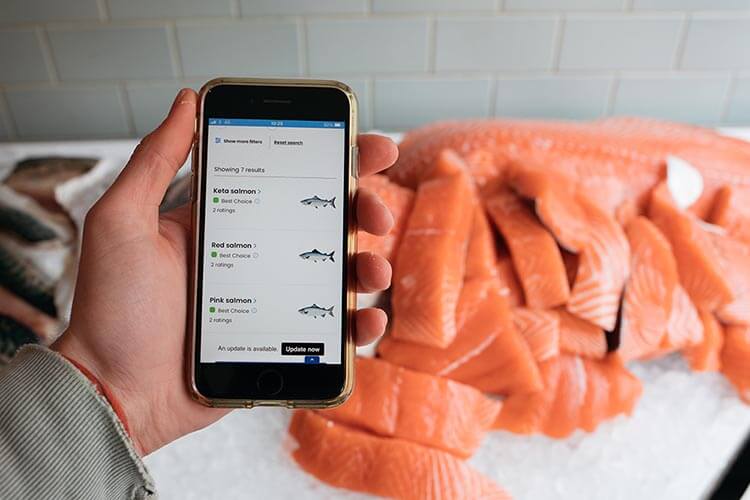
The Marine Conservation Society has made a series of recommendations for consumers to make sustainable seafood shopping choices following the latest round of updates to its Good Fish Guide.
Covering seafood sold or produced in the UK, the Good Fish Guide is designed to inform consumers and businesses which seafood options are the most environmentally friendly. The guide uses a simple traffic light system to identify which species are currently most sustainable based on where and how it is caught or farmed: green for best choices; amber for those which are okay but for which improvements are needed; and red to indicate which fish to avoid.
Most of the seafood consumed in the UK comprises just a handful of species, known as the ‘Big Five’: cod, haddock, salmon, tuna and prawns. This puts a lot of pressure on wild stocks of those species, creating a demand which can drive unsustainable fishing and farming practices.
‘Every fish species plays a unique role in the marine food web. By diversifying our consumption, we reduce the pressure on vulnerable ecosystems and help to support local fishers and producers,’ said Charlotte Coombes, MCS Good Fish Guide Manager.
‘Not only are there lots of like-for-like options out there, but exploring lesser-known species introduces us to new culinary experiences, enriching our palates while lessening the strain on overexploited favourites.’
You may also like:
- Only 13 per cent of MCS seafood ratings are ‘green’
- Mackerel no longer sustainable says MCS
- UK government to be taken to court for allowing overfishing
- Citizen Science Month: How you can help save our seas
- MCS ‘State of Our Beaches’ report highlights need to cut plastic pollution
MCS’ sustainable seafood swap recommendations
Swap cod for hake
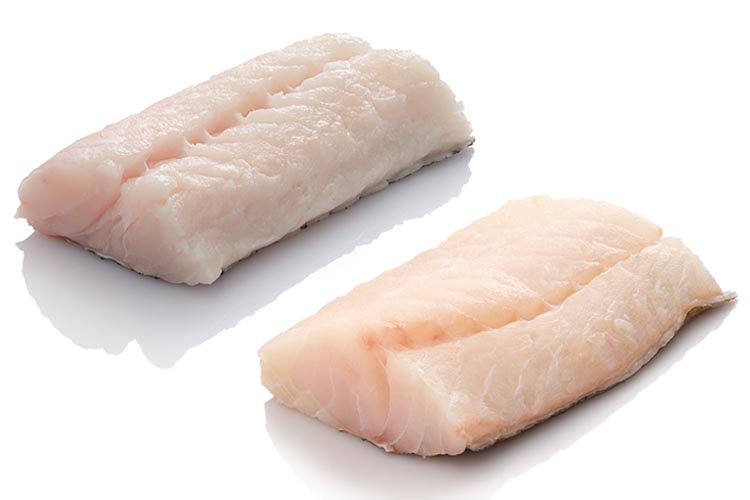
UK cod stocks have been low in recent decades due to overfishing, however, there are signs that populations in the North Sea are beginning to recover following catch restrictions imposed in 2019. Icelandic and Arctic cod are the most common cod fisheries on sale in the UK, and while this can be a green-rated choice, sustainability varies depending on how and where it was caught.
MCS recommends: The Marine Conservation Society recommends swapping cod for hake, wild-caught in UK seas. Hake Is a white fish with a meaty and flaky texture similar to cod; can be swapped like-for-like in most recipes, and it’s great pan-fried or in a stew. Thanks to good management and beneficial environmental conditions, hake from the UK is a sustainable consumer choice.
Swap prawns for mussels
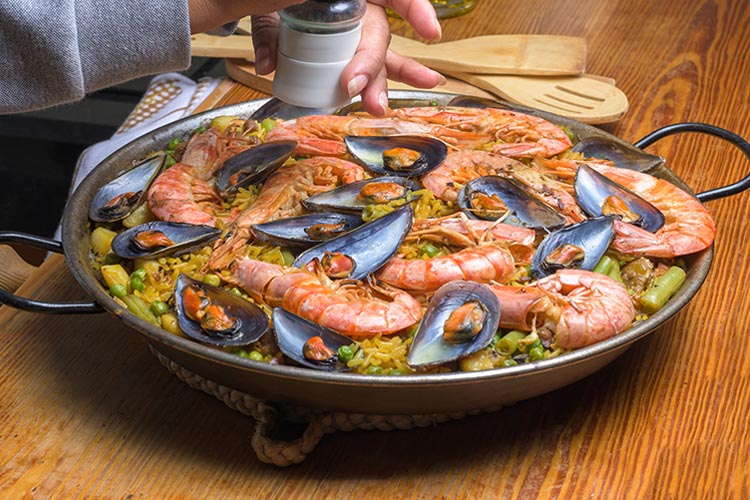
One of the UK’s favourite shellfish, prawns are sourced from all over the world. The MCS Good Fish Guide indicates that there are several sustainable options, and the charity says that eco-labels such as ‘Organic’, ‘MSC’ or ‘ASC’ are the best choices, although sustainability is greatly influenced by the species (king, tiger or cold water, for example), and where and how they were caught or farmed.
MCS recommends: The Marine Conservation Society recommends swapping prawns for UK rope-grown mussels, which are grown using low-impact methods and harvested by hand, making them one of the most sustainable and ocean-friendly seafood options. Mussels are also packed full of protein and nutrients and can be swapped for prawns in many recipes.
Check out the MCS guide on how to prepare mussels.
Swap salmon for farmed trout
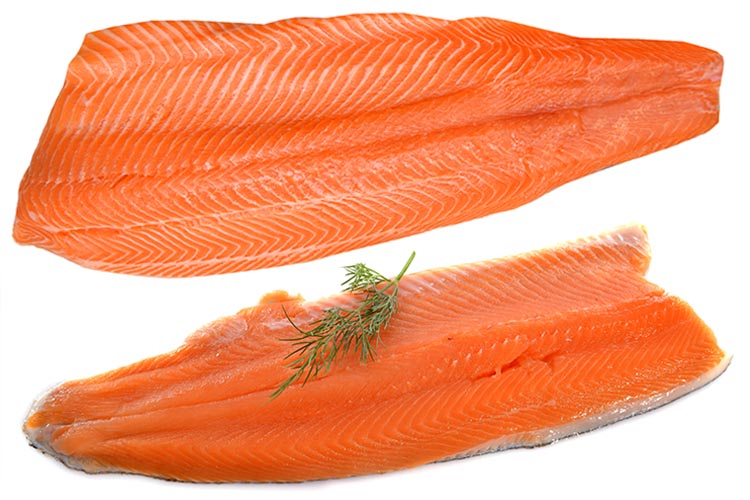
Salmon is the single most popular fish consumed in the UK. However, because of this popularity, numbers of wild-caught Atlantic salmon have fallen dangerously low, and it is red-rated on the charity’s Good Fish Guide. Most UK supermarkets sell farmed Atlantic salmon, or wild-caught Pacific salmon. Sustainability varies depending on where and how they’re caught or farmed.
MCS recommends: for a simple swap, the Marine Conservation Society suggests buying UK freshwater-farmed rainbow trout instead of salmon. A close relative of salmon, trout is similar in texture with a slightly stronger flavour. It’s widely available in supermarkets across the UK, both in fillets and smoked, and can be swapped like-for-like in recipes that would otherwise use salmon.
Swap tuna for anchovies or sardines
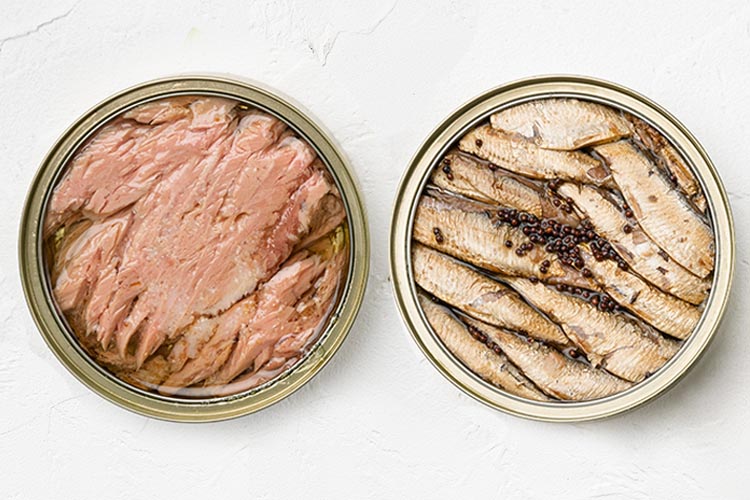
Most of the tuna consumed in the UK is wild-caught from the ocean, and ratings range from green to red depending on species and fishing method – skipjack and albacore tuna caught by pole and line or troll are the most sustainable options; information which is sometimes listed on the packaging.
MCS recommends: The Marine Conservation Society recommends swapping tuna for anchovies caught in the Bay of Biscay or MSC-certified sardines from Cornwall. Much like tuna, anchovies and sardines are oily, fatty fishes packed full of omega-3 and nutrients and also available in tins and jars, potentially making for a healthy and convenient replacement for tuna in a pasta sauce or salad. There are some red-rated options for these species, so make sure to check the label and avoid sardines from the Bay of Biscay and anchovies from Portuguese waters.
Swap haddock for coley

The Marine Conservation Society’s Good Fish Guide lists wild-caught haddock as a generally sustainable option. However, there is a risk of cod getting accidentally caught in nets from haddock fisheries as they often swim together.
MCS recommends: Due to the potential for the catching of haddock to impact cod stocks, the Marine Conservation Society recommends swapping haddock for saithe, also known as coley (also pollock), from the North Sea. Coley is a white fish, closely related to haddock, but with a stronger flavour and meatier texture, and stocks of the species are booming, making it a sustainable swap for chip shops and supermarkets – perfect for a fish pie.
More information on the Marine Conservation Society’s Good Fish Guide can be found on the charity’s website.


